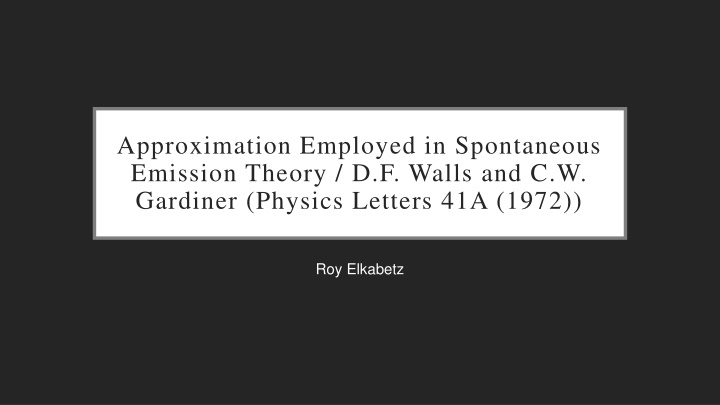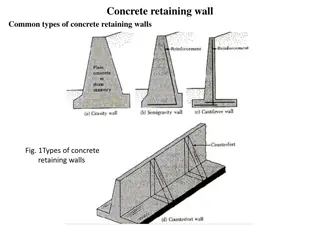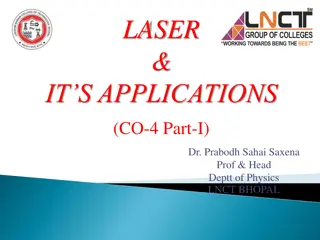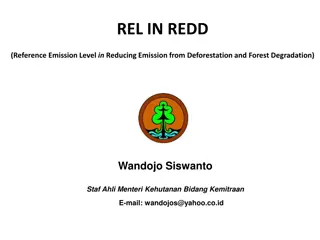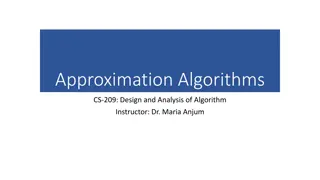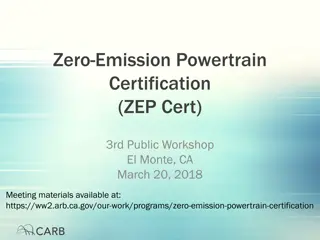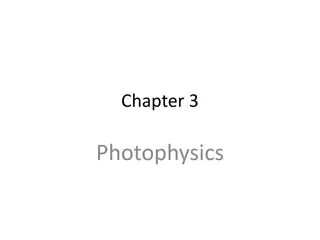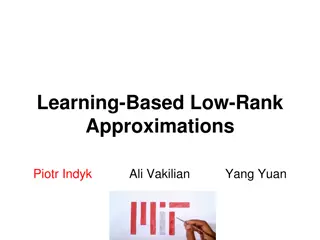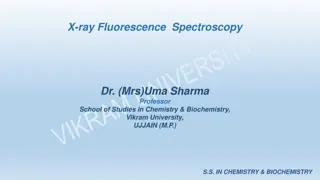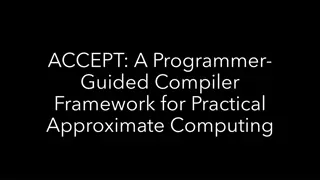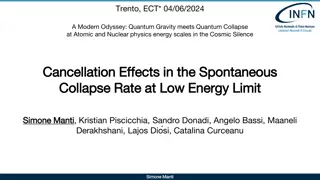Approximation Employed in Spontaneous Emission Theory / D.F. Walls and C.W. Gardiner (Physics Letters 41A (1972))
Examining the approximations utilized in Spontaneous Emission Theory by Walls and Gardiner in 1972. Discusses the motivation, Hamiltonian derivation, and comparisons between R.W.A and the Ladder approximations.
Download Presentation

Please find below an Image/Link to download the presentation.
The content on the website is provided AS IS for your information and personal use only. It may not be sold, licensed, or shared on other websites without obtaining consent from the author.If you encounter any issues during the download, it is possible that the publisher has removed the file from their server.
You are allowed to download the files provided on this website for personal or commercial use, subject to the condition that they are used lawfully. All files are the property of their respective owners.
The content on the website is provided AS IS for your information and personal use only. It may not be sold, licensed, or shared on other websites without obtaining consent from the author.
E N D
Presentation Transcript
Approximation Employed in Spontaneous Emission Theory / D.F. Walls and C.W. Gardiner (Physics Letters 41A (1972)) Roy Elkabetz
Outline Motivation Atom Field Hamiltonian Derivation of the Wigner - Weisskopf approximations Comparison between the R.W.A and the Ladder approximation Conclusions
Motivation o Solving Schrodinger s equation using non perturbative methods o Introduce the equivalence of the WWI approximation to the RWA o Show the resemblance between the RWA, the Ladder approximation and the WWI approximation
Background Two level Atom in radiation field Hamiltonian atom radiation ? = ?0+ ?1 ??+ ? ?? ?0= ?? ?? ? ? > < ? atomic operator + ?? ?++ ? ?1= ?? ?? ? coupling constant creation of photon annihilation of photon
Derivation of the Wigner - Weisskopf Approximations Wigner Weisskopf approximation (WW ) excited atom, no photons |?,0 > |?,1?> atom in ground state, one photon in mode ? ? ? > = ?0? ? ??0??,0 > + ??? ? ????|?,1? > ? is the Bohr frequency ??= ?? ?0
Derivation of the Wigner - Weisskopf Approximations Wigner Weisskopf approximation (WW ) ? ? > = ?0? ? ??0??,0 > + ??? ? ????|?,1?> ? ? ??? = ?0? ????0?< ?,1??1?,0 > ??? ? ???0?< ?,0 ?1?,1?> ? ?0? = ? ??0=:?? ?0
Derivation of the Wigner - Weisskopf Approximations Wigner Weisskopf approximation (WW ) ? ? > = ?0? ? ??0??,0 > + ??? ? ????|?,1? > ? ? ??? = ?0? ????0?< ?,1??1?,0 > ??? ? ???0?< ?,0 ?1?,1?> ? ?0? = ? The WW Approximation
Derivation of the Wigner - Weisskopf Approximations Solving for ??? ?0? = 0 = 1 ??? = 0 = 0 Initial conditions: ? ??? =1 ?? ?0? ????0? < ?,1??1?,0 > ? 0 ??? ? ???0?< ?,0 ?1?,1?> ? ?0? = ?
Derivation of the Wigner - Weisskopf Approximations Solving for ??? ? ?0? = ??0?00 ? 1 ?? ?0? ????0(? ?) < ?,1??1?,0 >2 2 ? 0 Defining the next transformation: ? ? = ?0? ???0? 1 2 < ?,1??1?,0 >2?? ?0 ??? ? ? = ?
Derivation of the Wigner - Weisskopf Approximations Solving for ??? ? ?0? = ??0?00 ? 1 ?? ?0? ????0(? ?) < ?,1??1?,0 >2 2 ? 0 ? ? ??? ? = ??? ? ?(? ?) 0 ? = ? ?
Derivation of the Wigner - Weisskopf Approximations Wigner Weisskopf approximation (WW ) Markov Process: A Markov process is a process where a future outcome of a system depends only on the present state of itself and not on former states from the past. Memoryless Process
Derivation of the Wigner - Weisskopf Approximations Wigner Weisskopf approximation (WW ) ? Recall: ? ??? ? = ??? ? ?(? ?) 0 WW approximation ~ Markov process ? ??? ? ?(?) ??? ? 0
Derivation of the Wigner - Weisskopf Approximations Wigner Weisskopf approximation (WW ) ?0? = ? ? 2?? ? ?0+ ?? The probability to stay in |?,0 > : 2= ? ?? P ? = ?0? Exponential Decay
R.W.A and Ladder Rotating Wave approximation (RWA) Approximation ? ) ??( ?? ?++ ?? ?1???= ? Annihilate a photon and excite the atom create a photon and atom in ground state The RWA holds for weak intensity and for ? ?0
R.W.A and Ladder Equivalence of WW and RWA Approximation ? ) ??( ?? ?++ ?? ?1???= ? ? ??? = ?0? ????0?< ?,? ?1????,0 > ??? ? ???0?< ?,0 ?1????,? > ? ?0? = ?
R.W.A and Ladder Equivalence of WW and RWA Approximation We get the same set of equations as in the WW approximation The WW approximation and the RWA are equivalent ? ??? = ?0? ????0?< ?,? ?1????,0 > ??? ? ???0?< ?,0 ?1????,? > ? ?0? = ?
R.W.A and Ladder Ladder Approximation Approximation ? = ?0+ ???? ??+ ??? ?0= ?? ?? ? ????= ? ? Atom basis: |1 >,|0 > Field basis: |0 >,|1a>,|2a>, ,|na 1 >,|na> Single photon approximation
R.W.A and Ladder Ladder Approximation: Diagrams Approximation Single photon approximation: |na 1 >,|na> zero photon scattering, virtual transitions single photon scattering + virtual transitions Figure 1: Diagrams included in Ladder approximation
R.W.A and Ladder Ladder Approximation: Diagrams Approximation Figure 2: Diagrams excluded from Ladder approximation
R.W.A and Ladder Ladder Approximation: Another Diagrams Approximation Figure 3: a) Diagrams included in Ladder approximation. b) Diagrams excluded from Ladder approximation.
R.W.A and Ladder The Ladder and the WWI Approximations Approximation We sum over infinite number of terms Notice that |1,na 1 >,|0,na> ~ |?,0 >,|?,1?> Ladder basis WWI basis The Ladder approximation and the WWI approximation has close resemblance
R.W.A and Ladder Ladder Approximation and RWA Approximation Under the assumptions: Single photon process Close to resonance There is a close resemblance between the RWA and the Ladder approximation
For spontaneous emission of a two level atom in radiation field Conclusions The RWA and the WWIapproximationare equivalent Using the approximations above has a clear superiority over finite perturbation techniques Under proper assumptions the RWA and the Ladder approximation are with close resemblance
The End Thank You For Listening
